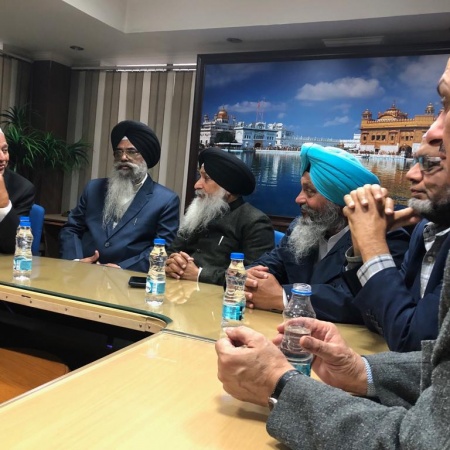Christmas in the Middle East
By Sumayyah Meehan MMNS Middle East Correspondent
The halls are decked and the trees are adorned, chock full of tinsel, baubles and more. The gifts are all nestled under the tree as eager hands wait for Christmas day to appear. The scene plays out all over the World even in the Middle East, which is comprised of primarily Islamic nations.
It’s a bit odd to see garland, artificial Christmas trees and cutouts of Santa Claus draping the storefronts of many businesses in the Middle East, which is the last place most would even think of the holiday being celebrated. However, due to an influx of non-Muslim expatriates, over the years, Christmas is now on the social calendar for many denizens of the Gulf. The Christmas buzz typically begins mid-November as the heat of the desert lingers on. Workers in stores wear Santa hats and special discounts are made available for the holiday. There are even annoying Christmas tunes played around the clock in most westernized retail outlets.
The city of Bethlehem, where Christians believe that Jesus was born, is just one of the Middle Eastern places where Christmas is celebrated. It is also fêted in Dubai, Bahrain, Kuwait and Iraq amongst other Gulf nations. But the country whose celebrations mirror the United States the most is Lebanon. There is a very small population of Maronite Christians living in Lebanon and, just like their western counterparts, Lebanese children look forward to Christmas day more so than any other day of the year. Christmas trees are decorated, lights adorn homes and stockings are hung. On the actually day itself, families gather to exchange gifts and dine on a meal of roasted turkey (sometimes chicken) and all the trimmings. Most Lebanese will attend church with their families during the evening of Christmas and the holiday is tucked away with the cutting of the ‘Yule Log’ cake which is often served with a steaming hot cup of Arabic coffee.
However, the bulk of Christians residing in the Gulf are expatriates hailing from non-Muslim countries. They are far away from their families and celebrating the Christmas holiday can be difficult even though most businesses have imported everything from shiny ornaments to strands of lights to wrapping paper. For this reason, many businesses and hotels have seized the opportunity to cultivate some cash on Christmas day to make celebrating effortless. In Dubai, for example, there are countless 5-star hotels offering full Christmas dinner banquets with traditional cuisine like turkey, cranberry sauce and mashed potatoes. And in Kuwait, a local western grocery chain has been taking orders for ‘Christmas Dinner’ for the past two months. The store will cook the entire meal from start to finish and deliver it right to the customer’s door. But of course, such service comes with a hefty price tag, which is out of the reach for many expatriates.
For many poor expatriates in the Gulf, even Christmas is just another day of living a hand-to-mouth existence. There will be no Christmas tree or gifts, let alone a meal fit for a king. With meager salaries stretched to the breaking point, there is no room for Christmas on the already overextended budget for most poor expatriates. And thanks to the global credit crunch, many skilled laborers who earn substantial salaries are also suffering. Scores of skilled laborers received their pink slips just prior to the holiday season as companies are making unprecedented cutbacks in their workforce. In Dubai, the home based Nakheel construction company shed 15% of its workforce this month. In an attempt to lighten such a shattering blow, one luxury hotel is spreading a bit of cheer in an otherwise precarious situation. The Arabian Park Hotel is offering a free meal to anyone who shows up at the restaurant with a pink slip in hand. The offer extends around the globe with even recently jobless tourists being able to take advantage of the hospitality.
Christmas is not a Muslim practice, although of course showing love and respect for the eminent prophet Jesus (as) is good.
However, religious tolerance that is in accordance with the Sunnah of Prophet Muhammad (s) dictates that members of the other world religions can have a safe haven within the Islamic lands to live, and even celebrate their festivals.
11-1













2008
1,693 views
views
0
comments